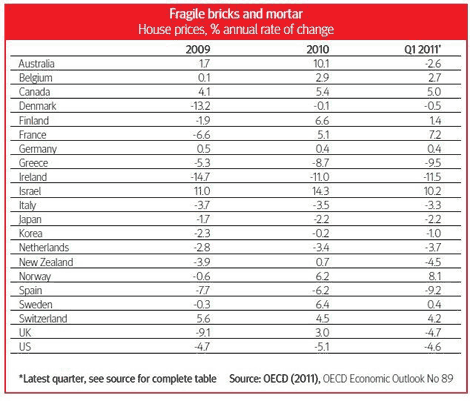Property market played a leading role in global financial crisis: OECD
Financial market failures were a major cause of the world’s economic crisis, but housing markets played a leading part, according to research by OECD research.
From the subprime debacle in the US to the bursting of unprecedented real estate bubbles in Ireland, Spain and Greece, among others, the overheating and collapse of property markets not only hurt savings and investments, but was felt throughout entire economies, affecting construction, employment, lending and spending, a report in the OECD Observer magazine notes.
“Generally speaking, real house prices had started to peak in the vast majority of OECD countries prior to the financial crisis,” say researchers Linda Rousová and Paul van den Noord in Predicting Peaks and Troughs in Real House Prices.
“But a striking development has been the rebound in real house prices in some (but not all) OECD countries since then.
“In Canada and Australia, for instance, as well as in Belgium, Finland, France, Norway, Sweden and Switzerland, prices have firmed up, in part thanks to substantial easing of monetary policies (with record low interest rates).”
The article notes prices had risen dramatically within some prime city markets such as Paris and London as investors fled less attractive property markets, and as stock markets became more volatile.
However the situation was far from positive elsewhere.
“Outside London, the UK market has barely seen any recovery at all, while in Denmark, Korea and New Zealand, property prices remain modest at best.
“The slide in real house prices continues unabated in Greece, Ireland, Italy, the Netherlands, Spain and the United States.
“Germany and Japan are the outliers, as they are still working off their housing bubbles from the early 1990s,” the article says.
“However, there are signs of bottoming out in Germany, while in Japan real house prices may finally trough in 2011 or 2012.”
The commentary suggests spotting such turning points in property markets is important to policymakers.
“OECD economists use what are called probit models, which compute the probability of peaks and troughs.
“The predictions are based on developments in basic indicators such as interest rates, the supply of new housing and the business cycle, not to mention the pace of house price changes observed in recent quarters.
It notes these probit exercises sketch a rather bleak near-term future for real house prices generally.
“For the countries where real house prices have seen an upswing, peaks are predicted to occur before the end of 2012,” the article says.
“This does not necessarily point to a ‘bubble’ in these countries, but it does spell a likely turning point.”
It concludes property markets in most of the countries where house prices have been falling –Denmark, Italy, Korea, the Netherlands, New Zealand and the UK – will remain volatile.
“However, the US, Greece, Ireland and Spain could see troughs in 2011 or 2012, though for the latter three this assumes a resolution is found to the current sovereign debt crisis, resulting in a narrowing of interest rate spreads with Germany.”

It notes among the 20 countries for which the OECD maintains a quarterly database for real house prices it is possible to distinguish four groups of countries in terms of their response to the financial crisis.
Australia was in the first with a relatively sharp rebound, in the range of 5% to 15%, being observed in eight countries (Australia, Belgium, Canada, Finland, France, Norway, Sweden and Switzerland).
“In three cases (Australia, Canada, Sweden), however, the rebound seems to have run out of steam, possibly in response to monetary policy tightening.”
The second, weaker and already faltering rebounds were observed in four countries (Denmark, Korea, New Zealand and the United Kingdom). In all these cases, the rebound in real house prices seems to have been akin to a “false start” in response to monetary policy easing, possibly masking a continued underlying downturn.
Third, an outright slide in real house prices is observed in six countries (Greece, Ireland, Italy, Netherlands, Spain and the United States). Among these, the by far sharpest downturns are observed in Greece, Ireland, Spain and the United States, with more moderate downturns in Italy and the Netherlands.
The fourth group showing long-term declines in real house prices were Germany and Japan when the financial crisis hit, as these were still working off their housing bubbles of the early 1990s. In the case of Germany real house prices seem to be gradually picking up since 2008.
The caveat is that, as with any market, making predictions about house prices was always surrounded by uncertainty.
“Even so, it seems likely that most countries now showing upswings in real house prices will see their housing cycle turn downwards in 2012, while declining property markets in most countries that are currently experiencing downturns are not expected to bottom out.”